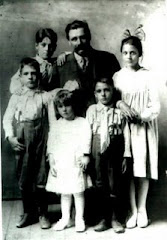 The Greek word translated hospitality is: phi-lo-xe-ni 'a, made up of two root words, meaning "love" and "stranger". So hospitality means "love of strangers". It involves a person's feelings and affections. It is much more than merely performing a duty or obligation, it actually is an expression of genuine fondness and affection. Yes, genuine hospitality transcends the division and discrimination due to prejudice or fear. (Compare Jesus words: Matt 5:46, 47)
The Greek word translated hospitality is: phi-lo-xe-ni 'a, made up of two root words, meaning "love" and "stranger". So hospitality means "love of strangers". It involves a person's feelings and affections. It is much more than merely performing a duty or obligation, it actually is an expression of genuine fondness and affection. Yes, genuine hospitality transcends the division and discrimination due to prejudice or fear. (Compare Jesus words: Matt 5:46, 47)Abraham discerned that three men, strangers some distance away were actually messengers from Jehovah. These visitors were both unknown and unexpected, by Abraham, but according to the custom in those days, a traveler in a strange place could expect to be cared for. But Abraham did not wait for these strangers to exercise this right, but he took the initiative! Yes, Abraham "began running" to meet these strangers- and "in the heat of the day"- at the age of 99 years old! His concern for their needs was paramont in his mind, a very positive quality indeed! Abraham wanted to support these messengers, who were obviously on a mission from Jehovah. Following the lead of her husband, in this matter of hospitality, Sarah worked along with Abraham preparing an extraordinary meal for these unexpected strangers, who were traveling by. To serve up such a fine meal in this warm climate, everything had to be prepared very quickly, in fact the scripture refers to Abraham "running" to get this meal on the table in a timely manner. In spite, of the feast Abraham prepared, he describes this provision in humble terms. (Gen 18:4,5) This teaches us that even those of little means can be hospitable, because it is the concern for the welfare and the desire to do good to others, to the best our circumstances allow, that is the most important in God's eyes. (Proverbs 15:17)
Both Abraham and Sarah laughed at the angelic announcement that they would have a son in their old age. Abraham was not reproved for his laughter, but Sarah was, she even fearfully tried to deny her laughter. It appears that Abraham's laugher was a result of joy over the amazing prospect of having a son by Sarah, in spite of their old age. But Sarah's laughter evidently was because the same amazing prospect struck her as humorous. Yes, she laughed within herself at the thought of an old man and an old woman having a child. However, neither one showed scorn or deliberate mocking in their laughter. Abraham and Sarah's, reactions are recorded as demonstrating faith in God's promise. (Compare: Romans 4:1, 18-22: Hebrews 11:1, 8-12)
The word "honor" is often used in the Bible to indicate the respect, esteem, and consideration that we should show others. We honor others by being kind to them, respecting their dignity, listening to their viewpoint, being ready to fulfill reasonable requests made of us. This is the way Jehovah treated Abraham.
Verses: 16-19:
In these next verses I found that Jehovah showed honor to Abraham by communicating with him about the near future. Jehovah explains his purpose for Abraham and his offspring, and letting Abraham know what he is going to do as regards to Sodom and Gomorrah.
"For the Sovereign Lord Jehovah will not do a thing unless he has revealed his confidential matter to his servants the prophets"-Amos 3:7.
Verses: 20-33:
We can see how Jehovah sets the example in showing honor in these verses. Jehovah created us with free will and does not treat us like mere robots. (1 Peter 2:16) Notice, Jehovah's conversation with Abraham, when he told Abraham that Sodom was to be destroyed for it's wickedness. Abraham asked, "Will you really sweep them away and not pardon the place for the sake of fifty?" Jehovah answered that he would spare the city for the sake of fifty righteous ones. Abraham continued to plead humbly. What if there were only 45? 40? 30? 20? 10? Jehovah assured Abraham that he would not destroy Sodom if just ten righteous men were found.
Jehovah knew there were not ten righteous men in Sodom, yet he honored Abraham by listening to his view and dealing with Abraham respectfully. Some people may wonder why the Sovereign of the Universe, the Creator of the heavens and the earth allowed Abraham such freeness of speech, to speak in this way. Remember, Jehovah was aware of Abraham's distressed feelings. He knew that Abraham's nephew Lot lived in Sodom, and Abraham was concerned about his safety. Also, Abraham was God's friend. (James 2:23) Friends try to discern the feelings behind words and make allowances, especially if he is a friend who is under emotional pressure of some kind. This account gives me much comfort, knowing we can approach our God with freeness of speech, no matter what the subject and Jehovah will be understanding.
Jehovah has given his servants both in heaven and on earth important assignments, but prayers are reserved for himself alone. Yes, Jehovah honors humans by allowing them to come to him directly in prayer. He is the "hearer of prayer", this freeness of speech is important especially when we are distressed and emotionally distraught. (Psalm 51:17; 65:2, 3)
Jehovah listens to the concerns of the hearts of his loyal ones, Showing them honor.
As we continue in our Bible reading we will learn another fact about our Creator:Jehovah does not destroy people indiscriminately. He protects the righteous.












 Here's where I want to be!
Here's where I want to be!























































































